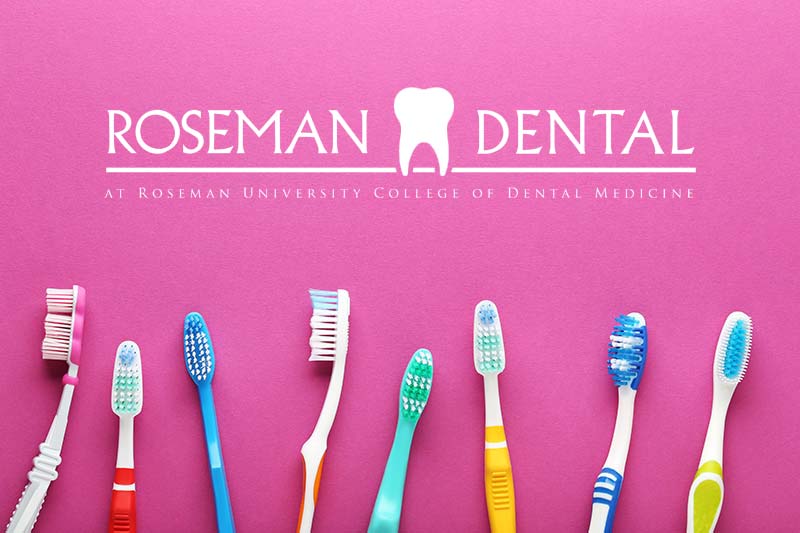
by Roseman Dental | Apr 18, 2023 | Dental 360, Dental Clinic Blog, Oral Health, Roseman Dental - NV, Roseman Dental - UT
Your teeth are important for everything from eating and nutrition to proper speech, so an injury to your teeth can have much larger implications than just affecting your beautiful smile. When engaging in certain kinds of physical activity, your mouth is potentially at risk for injury causing knocked-out teeth and injuries to the gums, lips, tongue, and surrounding tissues. Make sure you are always careful and take preventative measures to ensure you teeth and mouth stay healthy and injury-free.
Situations Where Tooth and Mouth Injuries Are Common
Most of your daily activities won’t put you at risk for tooth injury, but in the following situations you will want to have a mouth guard or take other precautions to prevent injury.
- Babies and toddlers who are learning to walk will stumble and fall a lot. It is important to keep an eye on them to make sure they are careful, and if they are in this early stumbling phase, don’t let them practice on a hard surface like concrete or asphalt.
- Sports injuries are a common reason for a visit to a dentist. Anyone who plays contact sports, such as boxing, football, basketball, soccer, or lacrosse needs to always wear a mouth guard. Even heavy physical exertion offers an opportunity to fall down and chip a tooth, so while it may not require a mouth guard, be sure to take care and watch your step!
- Some people experience tooth pain when they wake up after sleeping for the night. If you are one of these, you may be grinding your teeth in your sleep. A visit to a doctor or dentist will reveal if your tooth damage is the result of grinding and your dentist can help you decide if wearing a mouth guard when you sleep is the best option.
You don’t have to avoid risky situations to avoid mouth injury. Just make sure to take the appropriate precautions before you go at it.

by Roseman Dental | Oct 5, 2022 | Dental Clinic Blog, Oral Health, Roseman Dental - NV, Roseman Dental - UT
Trick-or-treating is the highlight of Halloween for most children, but excessive candy consumption can be harmful to a child’s dental and physical heath. Halloween doesn’t have to be a sugar-laden free-for-all. There are many ways to limit your child’s sugar intake without a making a scary scene.
- Collect Less Candy – Limit the amount of candy your child collects by having her use a smaller treat bag and calling it quits once the bag is filled. You can also set a time limit on her trick-or-treating or visit only houses within a certain walking distance.
- Trade Candy For Cash – Many dentists participate in a candy buyback program. If yours doesn’t, consider forking out some of your own cash in exchange for your kid’s candy, then donate the stash to a local shelter or a branch of the military.
- Plan a Visit From the Candy Fairy – If your child is too young to be interested in cash, consider swapping the loot for a toy they have had their eye on. Instruct your child to leave the goodies in a special location, and make the trade while they are asleep.
- Ration the Goodies – Let your child pick out a few of his favorites on Halloween night, then store the rest out of sight and out of reach. Pack one small piece in his or her lunch each day, or save it to dole out only on special occasions.
- Pass Out An Alternate Treat – You can do your part to limit junk food in your neighborhood by passing out something other than candy. Stock up on stickers, glow sticks or another prize to give away, and encourage your neighbors to do the same.
However you choose to prevent sugar overload this holiday, be sure your child knows what to expect beforehand. Fill her up with a healthy dinner before she begins knocking on doors, and allow a little indulging before the night is over. Have a plan for the rest of the candy, and no matter how late your little ghoul is up, don’t send her to bed without brushing!

by Roseman Dental | Oct 1, 2022 | Dental Clinic Blog, Oral Health, Roseman Dental - UT
Brushing and flossing regularly are essential habits for healthy teeth, but did you know that nutrition is also important to the overall health of your mouth? It’s especially important to help kids start healthy eating habits while they’re young and their teeth are still developing. Here are the top nutrition tips to keep your family’s oral health strong.
1. Don’t Put the Baby to Bed with a Bottle
Many people like to put their baby to bed with a bottle of milk or other drink. However, this seemingly harmless practice actually allows bacteria to flourish and can lead to tooth decay. Giving your baby a bottle at night is okay, but make sure you follow it up with a gentle tooth-brushing session (or simply wiping their gums with a warm washcloth if they don’t have teeth yet) before putting your baby in bed.
2. Eat Plenty of Fresh Vegetables and Fruits
The standard American diet is extremely high in sugar. While avoiding sugar entirely may not be practical, it is best to limit consumption of sweets and sodas since they increase the risk of cavities. Even so-called “fruit” drinks contain highly concentrated amounts of sugar and should not be consumed in excess. Make sure to check the nutrition facts to get the real scoop on how much sugar is involved, even if a beverage claims to be fruit-based. If you or your children do have sweets, make sure to brush soon afterwards.
3. Avoid Sugary Foods
The standard American diet is extremely high in sugar, and while it may not be practical to avoid sugar altogether, it is best to limit consumption of sweets and sodas since they increase the risk of cavities. Even so-called “fruit” drinks contain highly concentrated amounts of sugar and should not be consumed in excess. If you or your children do have sweets, make sure to brush soon afterwards.
4. Drink Water with Food
Drinking water with each meal helps to wash away food particles and bacteria that might otherwise become stuck on or between the teeth and contribute to tooth decay. Taking a drink of water immediately after a meal serves the same purpose and can keep your mouth from becoming too dry.
A nutritious diet is just as important for oral health as brushing and flossing. Improving your current diet can be as easy as adding an extra portion of vegetables or fruit to a meal, eating fewer sweets, and increasing your water intake. Small changes can make a big difference.
Talk with your dentist about how your nutrition and oral health are connected. If you don’t have your next check-up on the calendar yet, make an appointment with Roseman Dental for affordable quality dental care.

by Roseman Dental | Apr 11, 2022 | Dental Clinic Blog, Oral Health, Roseman Dental - NV, Roseman Dental - UT
Oral hygiene is essential for your overall wellbeing, not just your oral health. In fact, gum disease is a major risk factor for developing certain dangerous health conditions, such as diabetes and heart disease. Brushing regularly is one of the best methods for keeping your teeth and gums healthy. However, how do you know which toothbrush is best to use?
Tips for Choosing a Toothbrush
There are specific features to look for in a toothbrush, regardless of whether it is powered or manual. The variety of styles, sizes, and shapes of toothbrushes available can make choosing the right one overwhelming. Here’s what to look for:
- Expert recommendations. Look for powered or manual toothbrushes with the American Dental Association Seal of Approval. You can also ask your dentist for a recommendation to ensure your toothbrush has passed quality control tests for safety and cleaning effectiveness.
- Bristle options. Manual toothbrushes or replacement heads for your electric toothbrush are available with hard, medium, or soft nylon bristles. Soft bristles are the safest and most comfortable option for most people. You could damage the enamel protecting your teeth, root surface, and gums depending on the strength of the bristles and how vigorously you brush your teeth. Rounded bristle tips offer even more protection.
- Toothbrush head size. The best size of toothbrush head is one that permits easy access to the surfaces of all your teeth. A toothbrush head that’s one-inch tall and a half-inch wide is easy to use for most adults and can reach all of your teeth efficiently. The toothbrush should have a long enough handle to hold it comfortably in your hand.
Make sure to replace your toothbrush every three months or when it begins to show wear, whichever comes first. It is also vital to replace your toothbrush after you’ve had a cold because the bristles can accumulate bacteria and result in reinfection.

by Roseman Dental | Mar 6, 2022 | Dental Clinic Blog, Oral Health, Roseman Dental - NV, Roseman Dental - UT
Pregnancy is an exciting time full of preparations for a new little one. It’s also a time when the body goes through countless changes from top to bottom. Most mothers-to-be notice the most obvious changes, ranging from weight gain to thicker hair. What they may not realize is that hormone shifts caused by pregnancy can impact their dental health. In fact, many women are shocked when their dentist finds multiple cavities following the birth of their child. Good periodontal health is essential while pregnant for the health of both moms and babies.
Greater Risk for Pre-Term Birth
Periodontal disease can cause infections, which can increase the levels of biological fluids that induce labor. Neglecting to adequately care for your teeth and gums during pregnancy can raise the risk of delivering before the 37-week mark. Preterm delivery can be dangerous for babies, as they may not yet be fully developed. These low-birth-weight babies are at risk for developmental delays and may even spend significant time in a neonatal intensive care unit following their entry into the world.
The Impact of Periodontal Disease
Nearly every pregnant woman deals with sore, swollen and bleeding gums, commonly known as “pregnancy gingivitis.” Proper oral hygiene is necessary to stop the issue from getting worse. Once gingivitis progresses into periodontal disease, it’s possible to become susceptible to other health concerns, including:
- Tooth loss
- Cardiovascular disease
- Diabetes
When brushing your teeth, make sure to focus the efforts around the gum line to get rid of plaque and bacterial build up. Flossing is an important part of a daily dental care routine too.
Women’s bodies sacrifice many nutrients as they work to grow tiny humans, which can leave the mouth without protection against bacteria. Regular dental check-ups and cleanings can keep moms on the right healthy path as they get ready to welcome new life.







